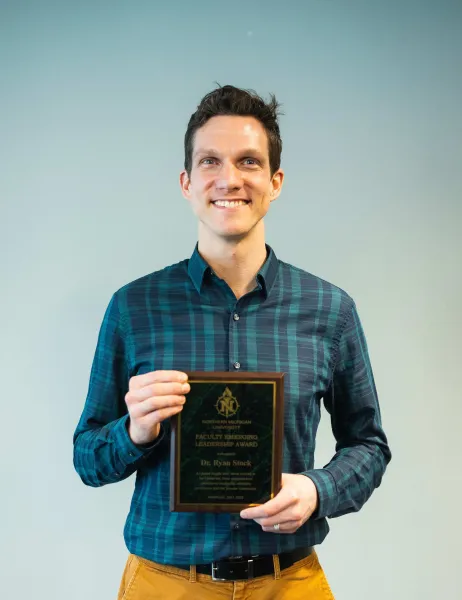Ryan Stock, assistant professor in the Earth, Environmental and Geographical Sciences Department at Northern Michigan University, is the 2021-22 recipient of the Faculty Emerging Leadership Award. He is a political ecologist whose work utilizes an intersectional perspective to examine the environmental injustices of climate change interventions and energy transitions.
Stock has multiple ongoing research projects investigating gender politics and energy dispossessions of solar parks, environmental injustices of solar PV life cycle, climate adaptation and vulnerability of farmers in India, gendered livelihoods and solar development in Ghana, climate policy in South Asia, and biopolitics of climate-smart agriculture in the U.S.
“I have been working on campaigns at NMU related to carbon neutrality, which has now been embedded in NMU's Strategic Plan, and anti-racism efforts," he said. "Off campus, I have been advocating for the City of Marquette to commit to carbon neutrality through its Climate Action Resolution and forthcoming Climate Action Plan."
His university service includes being the coordinator of NMU's Northern Climate Network, an appointed member of the Sustainability Advisory Council, and a member of the Gender and Sexuality Studies Program Committee. He is also a member of the JEDI Collective (justice, equity, diversity, inclusion) and the Undergrad Research Advisory Board.
Stock is a member of the Marquette County Climate Adaptation Task Force, a local social justice activist and former Fulbright Scholar and Peace Corps volunteer. He is also a board member of the American Association of Geographers' Energy and Environment Specialty Group.
“To me, leadership is having the vision of sustainable and equitable possibilities, along with the courage to work systematically to transform possibility into reality,” said Stock.
Upon being notified of the award, Stock noted that he had immense gratitude for his peers for recognizing him as a leader, and he had strong validation that the vital work he does is viewed by the administration as necessary and worth prioritizing.
He holds a doctorate in geography from the University of Illinois, a master's in natural resources and environment from the University of Michigan, and a bachelor's in anthropology from the University of Utah.

